Unit 4 Why don't you talk to your parents?知识点总结与练习学案(含答案解析) 人教版英语八年级下册
文档属性
| 名称 | Unit 4 Why don't you talk to your parents?知识点总结与练习学案(含答案解析) 人教版英语八年级下册 |
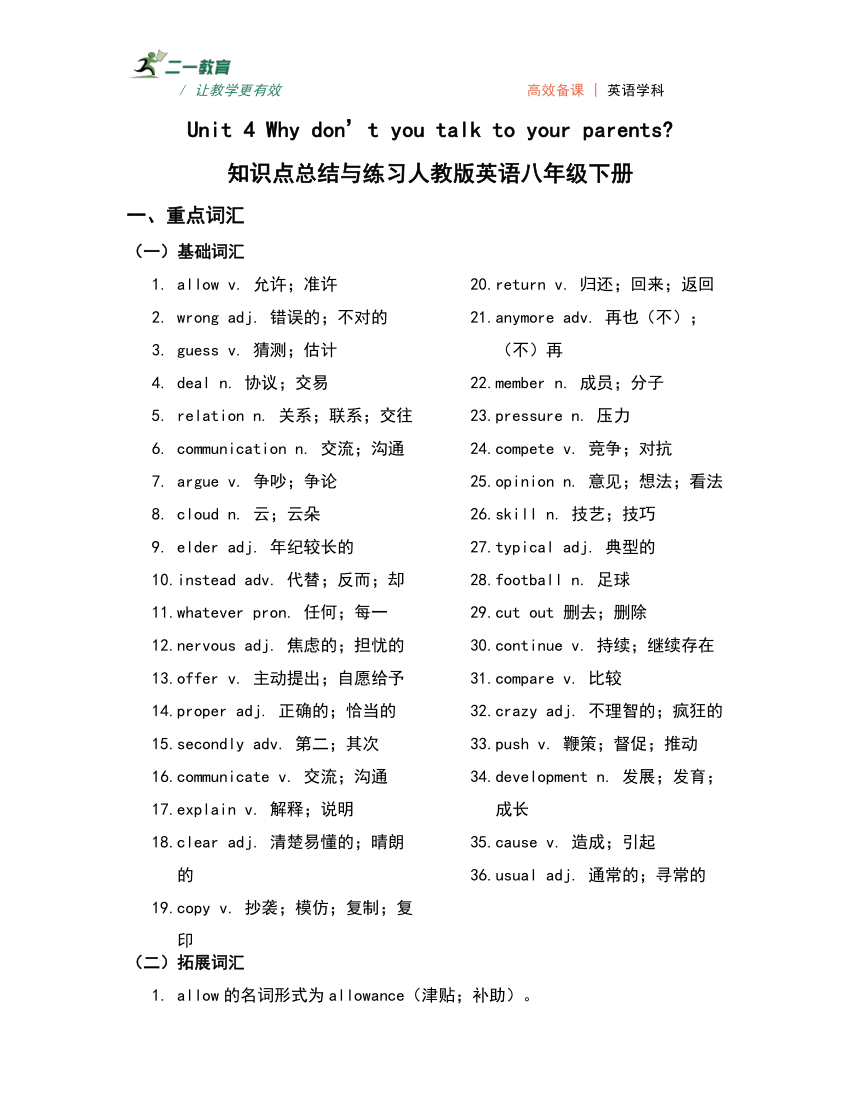
|
|
| 格式 | docx | ||
| 文件大小 | 43.8KB | ||
| 资源类型 | 试卷 | ||
| 版本资源 | 人教新目标(Go for it)版 | ||
| 科目 | 英语 | ||
| 更新时间 | 2025-05-16 00:00:00 | ||
图片预览

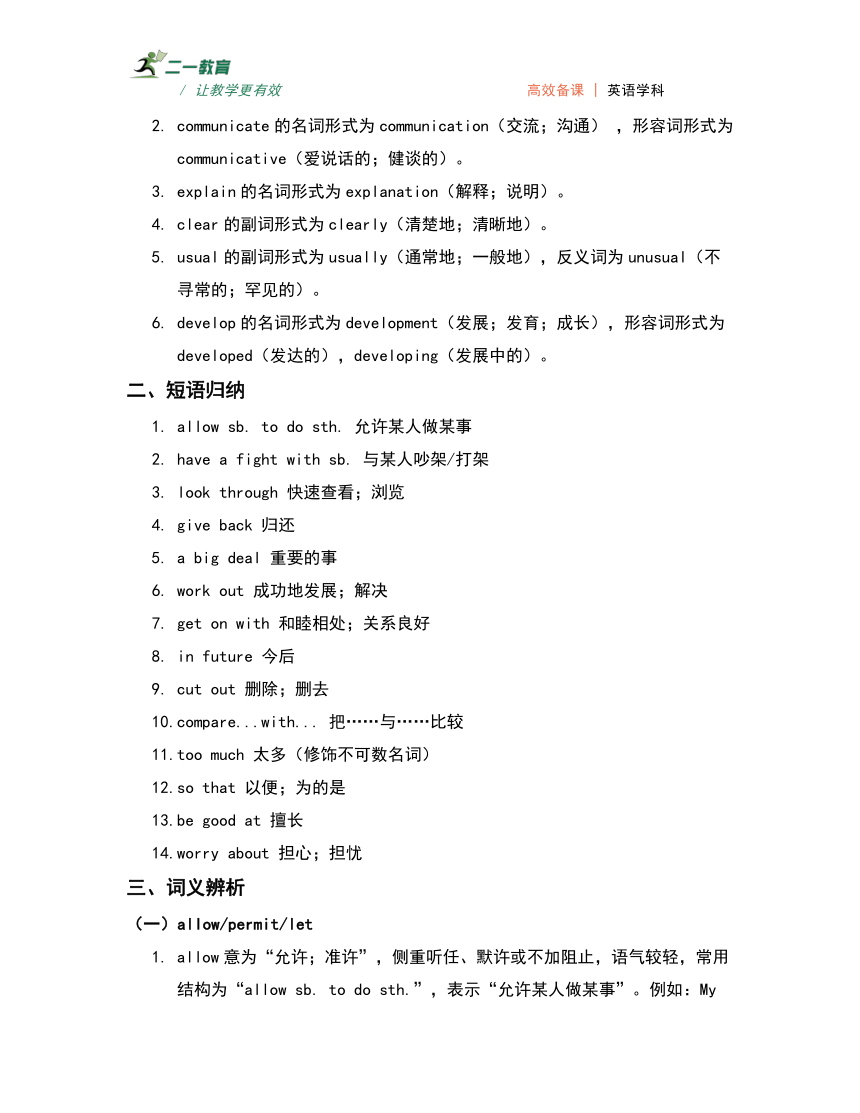
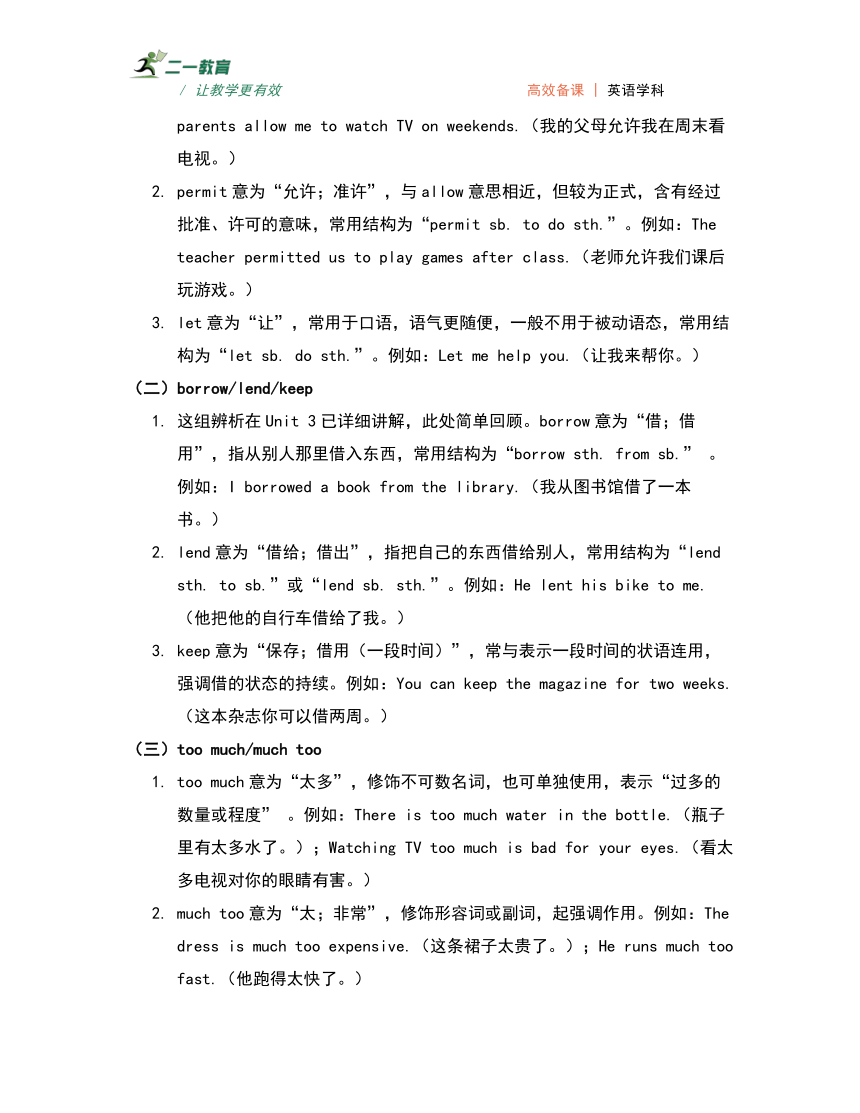
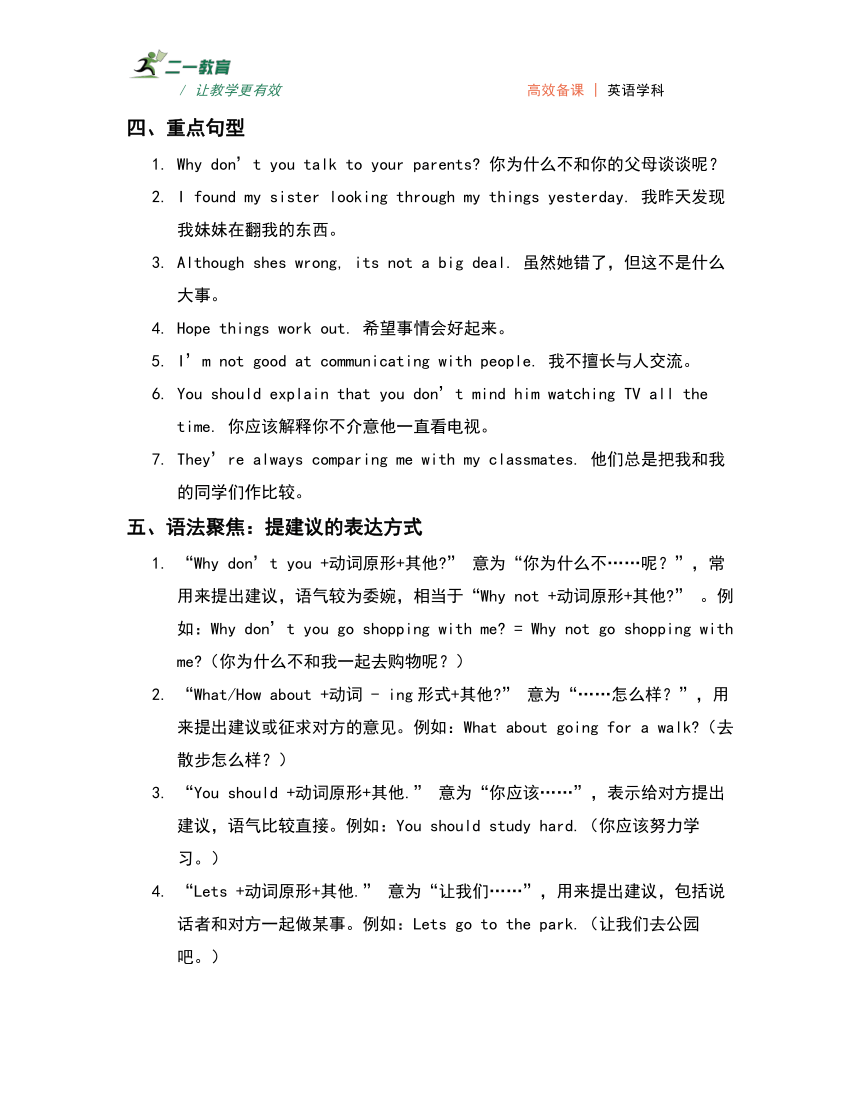
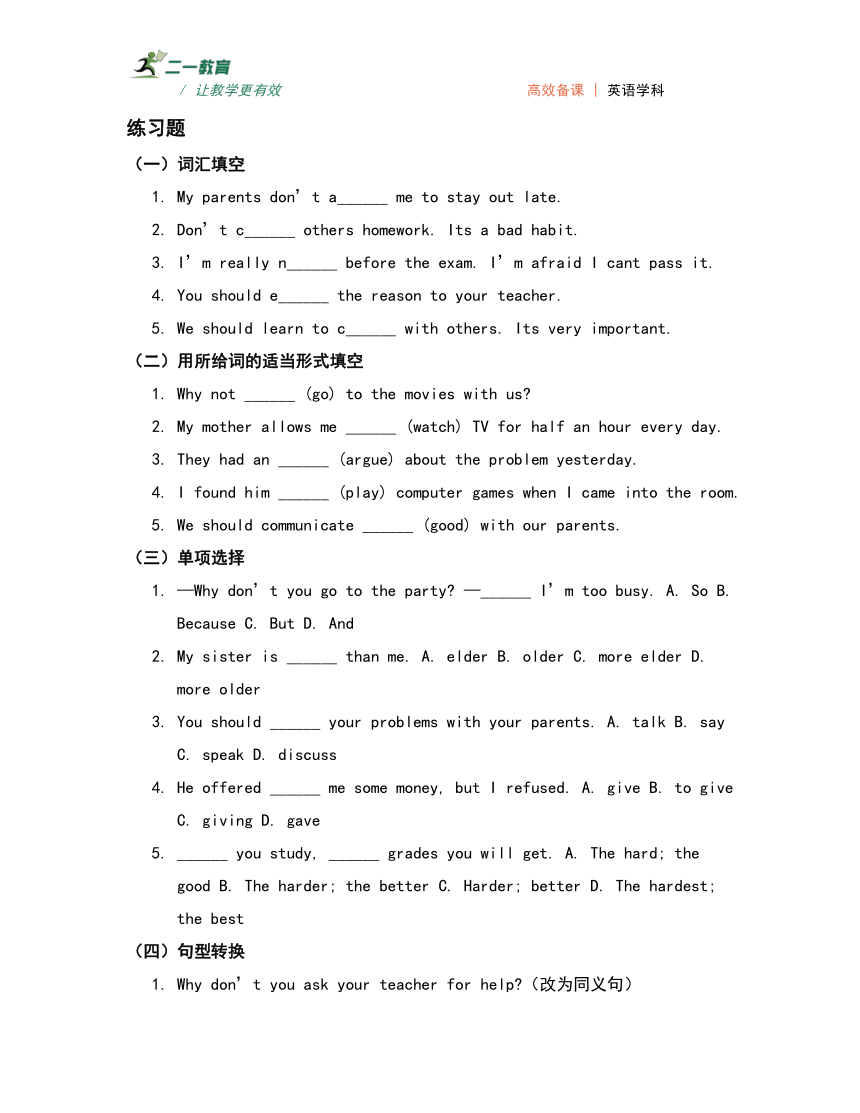
文档简介
Unit 4 Why don’t you talk to your parents
知识点总结与练习人教版英语八年级下册
一、重点词汇
(一)基础词汇
/ 让教学更有效 高效备课 | 英语学科
allow v. 允许;准许
wrong adj. 错误的;不对的
guess v. 猜测;估计
deal n. 协议;交易
relation n. 关系;联系;交往
communication n. 交流;沟通
argue v. 争吵;争论
cloud n. 云;云朵
elder adj. 年纪较长的
instead adv. 代替;反而;却
whatever pron. 任何;每一
nervous adj. 焦虑的;担忧的
offer v. 主动提出;自愿给予
proper adj. 正确的;恰当的
secondly adv. 第二;其次
communicate v. 交流;沟通
explain v. 解释;说明
clear adj. 清楚易懂的;晴朗的
copy v. 抄袭;模仿;复制;复印
return v. 归还;回来;返回
anymore adv. 再也(不);(不)再
member n. 成员;分子
pressure n. 压力
compete v. 竞争;对抗
opinion n. 意见;想法;看法
skill n. 技艺;技巧
typical adj. 典型的
football n. 足球
cut out 删去;删除
continue v. 持续;继续存在
compare v. 比较
crazy adj. 不理智的;疯狂的
push v. 鞭策;督促;推动
development n. 发展;发育;成长
cause v. 造成;引起
usual adj. 通常的;寻常的
(二)拓展词汇
allow的名词形式为allowance(津贴;补助)。
communicate的名词形式为communication(交流;沟通) ,形容词形式为communicative(爱说话的;健谈的)。
explain的名词形式为explanation(解释;说明)。
clear的副词形式为clearly(清楚地;清晰地)。
usual的副词形式为usually(通常地;一般地),反义词为unusual(不寻常的;罕见的)。
develop的名词形式为development(发展;发育;成长),形容词形式为developed(发达的),developing(发展中的)。
二、短语归纳
allow sb. to do sth. 允许某人做某事
have a fight with sb. 与某人吵架/打架
look through 快速查看;浏览
give back 归还
a big deal 重要的事
work out 成功地发展;解决
get on with 和睦相处;关系良好
in future 今后
cut out 删除;删去
compare...with... 把……与……比较
too much 太多(修饰不可数名词)
so that 以便;为的是
be good at 擅长
worry about 担心;担忧
三、词义辨析
(一)allow/permit/let
allow意为“允许;准许”,侧重听任、默许或不加阻止,语气较轻,常用结构为“allow sb. to do sth.”,表示“允许某人做某事”。例如:My parents allow me to watch TV on weekends.(我的父母允许我在周末看电视。)
permit意为“允许;准许”,与allow意思相近,但较为正式,含有经过批准、许可的意味,常用结构为“permit sb. to do sth.”。例如:The teacher permitted us to play games after class.(老师允许我们课后玩游戏。)
let意为“让”,常用于口语,语气更随便,一般不用于被动语态,常用结构为“let sb. do sth.”。例如:Let me help you.(让我来帮你。)
(二)borrow/lend/keep
这组辨析在Unit 3已详细讲解,此处简单回顾。borrow意为“借;借用”,指从别人那里借入东西,常用结构为“borrow sth. from sb.” 。例如:I borrowed a book from the library.(我从图书馆借了一本书。)
lend意为“借给;借出”,指把自己的东西借给别人,常用结构为“lend sth. to sb.”或“lend sb. sth.”。例如:He lent his bike to me.(他把他的自行车借给了我。)
keep意为“保存;借用(一段时间)”,常与表示一段时间的状语连用,强调借的状态的持续。例如:You can keep the magazine for two weeks.(这本杂志你可以借两周。)
(三)too much/much too
too much意为“太多”,修饰不可数名词,也可单独使用,表示“过多的数量或程度” 。例如:There is too much water in the bottle.(瓶子里有太多水了。);Watching TV too much is bad for your eyes.(看太多电视对你的眼睛有害。)
much too意为“太;非常”,修饰形容词或副词,起强调作用。例如:The dress is much too expensive.(这条裙子太贵了。);He runs much too fast.(他跑得太快了。)
四、重点句型
Why don’t you talk to your parents 你为什么不和你的父母谈谈呢?
I found my sister looking through my things yesterday. 我昨天发现我妹妹在翻我的东西。
Although shes wrong, its not a big deal. 虽然她错了,但这不是什么大事。
Hope things work out. 希望事情会好起来。
I’m not good at communicating with people. 我不擅长与人交流。
You should explain that you don’t mind him watching TV all the time. 你应该解释你不介意他一直看电视。
They’re always comparing me with my classmates. 他们总是把我和我的同学们作比较。
五、语法聚焦:提建议的表达方式
“Why don’t you +动词原形+其他 ” 意为“你为什么不……呢?”,常用来提出建议,语气较为委婉,相当于“Why not +动词原形+其他 ” 。例如:Why don’t you go shopping with me = Why not go shopping with me (你为什么不和我一起去购物呢?)
“What/How about +动词 - ing形式+其他 ” 意为“……怎么样?”,用来提出建议或征求对方的意见。例如:What about going for a walk (去散步怎么样?)
“You should +动词原形+其他.” 意为“你应该……”,表示给对方提出建议,语气比较直接。例如:You should study hard.(你应该努力学习。)
“Lets +动词原形+其他.” 意为“让我们……”,用来提出建议,包括说话者和对方一起做某事。例如:Lets go to the park.(让我们去公园吧。)
练习题
(一)词汇填空
My parents don’t a______ me to stay out late.
Don’t c______ others homework. Its a bad habit.
I’m really n______ before the exam. I’m afraid I cant pass it.
You should e______ the reason to your teacher.
We should learn to c______ with others. Its very important.
(二)用所给词的适当形式填空
Why not ______ (go) to the movies with us
My mother allows me ______ (watch) TV for half an hour every day.
They had an ______ (argue) about the problem yesterday.
I found him ______ (play) computer games when I came into the room.
We should communicate ______ (good) with our parents.
(三)单项选择
—Why don’t you go to the party —______ I’m too busy. A. So B. Because C. But D. And
My sister is ______ than me. A. elder B. older C. more elder D. more older
You should ______ your problems with your parents. A. talk B. say C. speak D. discuss
He offered ______ me some money, but I refused. A. give B. to give C. giving D. gave
______ you study, ______ grades you will get. A. The hard; the good B. The harder; the better C. Harder; better D. The hardest; the best
(四)句型转换
Why don’t you ask your teacher for help (改为同义句)
______ ______ ask your teacher for help
She should say sorry to her friend.(改为一般疑问句)
______ she ______ sorry to her friend
I found my brother was reading my diary.(改为简单句)
I found my brother ______ my diary.
He is so young that he cant go to school.(改为同义句)
He is ______ young ______ go to school.
They are comparing their children with others.(对划线部分提问) ______ are they ______
(五)阅读理解
Nowadays, more and more Chinese teenagers find life more difficult without their parents. They don’t know how to do housework because their parents do almost everything for them at home. This is a big problem. Joy is 14 years old. One day her parents went away on business, so she had to stay at home alone. At first she thought she would be happy because her parents were not in. She could do everything that she liked. But it was six o’clock in the evening, she felt hungry. “Oh, its time to have dinner. Where can I get my food ” she said as f039; herself. Later she found some food in the fridge, but she didn’t know how to cook. At last she could only go to the supermarket and f039; ate some bread. Many teenagers are the same as Joy. So I think they should learn some basic life skills, like cooking, tidying up their rooms or dressing themselves properly. They shouldn’t depend too much on their c039; parents.
Why do more and more Chinese teenagers find life more difficult without their parents A. Because they don’t know how to do housework. B. Because their parents ask them to do too much housework. C. Because they like their parents very much. D. Because they are too young.
What did Joy do when she felt hungry A. She cooked some food. B. She went to the supermarket and bought some food to eat. C. She asked her parents for help. D. She slept all the time.
What should teenagers learn according to the passage A. They should learn some basic life skills. B. They should learn how to make money. C. They should learn how to play computer games. D. They should learn how to talk with others.
Whats the best c039; title for this passage A. Joys Life B. How to Cook C. Depend on Parents D. Learn to Be Independent
(六)书面表达
假如你是大明,你的朋友Tony最近和父母发生了矛盾,他给你写了一封邮件倾诉。请你根据邮件内容给他回一封邮件,给出你的建议。 Dear Daming, I’m really sad these days. I had a big fight with my parents. They always ask me to study all the time. I feel so tired. I don’t know what to do. Can you give me some advice Yours, Tony 要求:
包含所有要点内容,可适当发挥;
语言表达准确,语意通顺、连贯;
词数:60 - 80词。
答案及解析
(一)词汇填空
【答案】allow 【解析】根据“我的父母不……我在外面待到很晚”及首字母a,可知是不允许,“allow sb. to do sth.”表示允许某人做某事,所以填allow。
【答案】copy 【解析】“不要……别人的作业,这是个坏习惯”,结合首字母c,“copy others homework”表示抄袭别人作业,故填copy。
【答案】nervous 【解析】“考试前我真的很……,我担心我不能通过”,nervous表示焦虑的、担忧的,所以填nervous。
【答案】explain 【解析】“你应该向你的老师……原因”,explain表示解释,故填explain。
【答案】communicate 【解析】“我们应该学会和别人……,这很重要”,communicate with sb.表示和某人交流,所以填communicate。
(二)用所给词的适当形式填空
【答案】go 【解析】“Why not +动词原形”表示为什么不做某事,所以填go。
【答案】to watch 【解析】“allow sb. to do sth.”表示允许某人做某事,所以填to watch。
【答案】argument 【解析】an后接名词,argue的名词形式是argument,所以填argument。
【答案】playing 【解析】“find sb. doing sth.”表示发现某人正在做某事,所以填playing。
【答案】well 【解析】修饰动词communicate要用副词,good的副词形式是well,所以填well。
(三)单项选择
【答案】B 【解析】回答“Why don’t you... ”的问句,用because引导原因状语从句,所以B正确。
【答案】B 【解析】表示年龄较大用older,elder常作定语修饰名词,不用于比较级,所以B正确。
【答案】D 【解析】discuss sth. with sb.表示和某人讨论某事,talk是不及物动词,say强调说的内容,speak常指说某种语言,所以D正确。
【答案】B 【解析】offer to do sth.表示主动提出做某事,所以B正确。
【答案】B 【解析】“the +比较级,the +比较级”表示“越……,就越……”,所以B正确。
(四)句型转换
【答案】Why not 【解析】“Why don’t you... ” = “Why not... ”,表示为什么不做某事。
【答案】Should; say 【解析】含有should的句子变一般疑问句,把should提前,动词用原形。
【答案】reading 【解析】“find sb. doing sth.”是简单句结构,原句是过去进行时,改为简单句用find sb. doing形式。
【答案】too; to 【解析】“so...that...”(如此……以至于……)引导结果状语从句,“too...to...”(太……而不能……)是简单句结构,二者可以转换。
【答案】What; comparing 【解析】对动作提问用what,原句是现在进行时,特殊疑问句结构为“What + be动词+主语+动词 - ing形式”,所以填What; comparing。
(五)阅读理解
【答案】A 【解析】根据“Nowadays, more and more Chinese teenagers find life more difficult without their parents. They don’t know how to do housework because their parents do almost everything for them at home.”可知,青少年离开父母生活更困难是因为他们不会做家务,所以A正确。
【答案】B 【解析】根据“At last she could only go to the supermarket and ate some bread.”可知,Joy饿了之后去超市买了面包吃,所以B正确。
【答案】A 【解析】根据“So I think they should learn some basic life skills, like cooking, tidying up their rooms or dressing themselves properly.”可知,青少年应该学习一些基本生活技能,所以A正确。
【答案】D 【解析】文章主要讲述了青少年过于依赖父母,不会做家务,作者建议他们学习基本生活技能,学会独立,所以D选项“学会独立”符合主旨。
(六)书面表达(略)
知识点总结与练习人教版英语八年级下册
一、重点词汇
(一)基础词汇
/ 让教学更有效 高效备课 | 英语学科
allow v. 允许;准许
wrong adj. 错误的;不对的
guess v. 猜测;估计
deal n. 协议;交易
relation n. 关系;联系;交往
communication n. 交流;沟通
argue v. 争吵;争论
cloud n. 云;云朵
elder adj. 年纪较长的
instead adv. 代替;反而;却
whatever pron. 任何;每一
nervous adj. 焦虑的;担忧的
offer v. 主动提出;自愿给予
proper adj. 正确的;恰当的
secondly adv. 第二;其次
communicate v. 交流;沟通
explain v. 解释;说明
clear adj. 清楚易懂的;晴朗的
copy v. 抄袭;模仿;复制;复印
return v. 归还;回来;返回
anymore adv. 再也(不);(不)再
member n. 成员;分子
pressure n. 压力
compete v. 竞争;对抗
opinion n. 意见;想法;看法
skill n. 技艺;技巧
typical adj. 典型的
football n. 足球
cut out 删去;删除
continue v. 持续;继续存在
compare v. 比较
crazy adj. 不理智的;疯狂的
push v. 鞭策;督促;推动
development n. 发展;发育;成长
cause v. 造成;引起
usual adj. 通常的;寻常的
(二)拓展词汇
allow的名词形式为allowance(津贴;补助)。
communicate的名词形式为communication(交流;沟通) ,形容词形式为communicative(爱说话的;健谈的)。
explain的名词形式为explanation(解释;说明)。
clear的副词形式为clearly(清楚地;清晰地)。
usual的副词形式为usually(通常地;一般地),反义词为unusual(不寻常的;罕见的)。
develop的名词形式为development(发展;发育;成长),形容词形式为developed(发达的),developing(发展中的)。
二、短语归纳
allow sb. to do sth. 允许某人做某事
have a fight with sb. 与某人吵架/打架
look through 快速查看;浏览
give back 归还
a big deal 重要的事
work out 成功地发展;解决
get on with 和睦相处;关系良好
in future 今后
cut out 删除;删去
compare...with... 把……与……比较
too much 太多(修饰不可数名词)
so that 以便;为的是
be good at 擅长
worry about 担心;担忧
三、词义辨析
(一)allow/permit/let
allow意为“允许;准许”,侧重听任、默许或不加阻止,语气较轻,常用结构为“allow sb. to do sth.”,表示“允许某人做某事”。例如:My parents allow me to watch TV on weekends.(我的父母允许我在周末看电视。)
permit意为“允许;准许”,与allow意思相近,但较为正式,含有经过批准、许可的意味,常用结构为“permit sb. to do sth.”。例如:The teacher permitted us to play games after class.(老师允许我们课后玩游戏。)
let意为“让”,常用于口语,语气更随便,一般不用于被动语态,常用结构为“let sb. do sth.”。例如:Let me help you.(让我来帮你。)
(二)borrow/lend/keep
这组辨析在Unit 3已详细讲解,此处简单回顾。borrow意为“借;借用”,指从别人那里借入东西,常用结构为“borrow sth. from sb.” 。例如:I borrowed a book from the library.(我从图书馆借了一本书。)
lend意为“借给;借出”,指把自己的东西借给别人,常用结构为“lend sth. to sb.”或“lend sb. sth.”。例如:He lent his bike to me.(他把他的自行车借给了我。)
keep意为“保存;借用(一段时间)”,常与表示一段时间的状语连用,强调借的状态的持续。例如:You can keep the magazine for two weeks.(这本杂志你可以借两周。)
(三)too much/much too
too much意为“太多”,修饰不可数名词,也可单独使用,表示“过多的数量或程度” 。例如:There is too much water in the bottle.(瓶子里有太多水了。);Watching TV too much is bad for your eyes.(看太多电视对你的眼睛有害。)
much too意为“太;非常”,修饰形容词或副词,起强调作用。例如:The dress is much too expensive.(这条裙子太贵了。);He runs much too fast.(他跑得太快了。)
四、重点句型
Why don’t you talk to your parents 你为什么不和你的父母谈谈呢?
I found my sister looking through my things yesterday. 我昨天发现我妹妹在翻我的东西。
Although shes wrong, its not a big deal. 虽然她错了,但这不是什么大事。
Hope things work out. 希望事情会好起来。
I’m not good at communicating with people. 我不擅长与人交流。
You should explain that you don’t mind him watching TV all the time. 你应该解释你不介意他一直看电视。
They’re always comparing me with my classmates. 他们总是把我和我的同学们作比较。
五、语法聚焦:提建议的表达方式
“Why don’t you +动词原形+其他 ” 意为“你为什么不……呢?”,常用来提出建议,语气较为委婉,相当于“Why not +动词原形+其他 ” 。例如:Why don’t you go shopping with me = Why not go shopping with me (你为什么不和我一起去购物呢?)
“What/How about +动词 - ing形式+其他 ” 意为“……怎么样?”,用来提出建议或征求对方的意见。例如:What about going for a walk (去散步怎么样?)
“You should +动词原形+其他.” 意为“你应该……”,表示给对方提出建议,语气比较直接。例如:You should study hard.(你应该努力学习。)
“Lets +动词原形+其他.” 意为“让我们……”,用来提出建议,包括说话者和对方一起做某事。例如:Lets go to the park.(让我们去公园吧。)
练习题
(一)词汇填空
My parents don’t a______ me to stay out late.
Don’t c______ others homework. Its a bad habit.
I’m really n______ before the exam. I’m afraid I cant pass it.
You should e______ the reason to your teacher.
We should learn to c______ with others. Its very important.
(二)用所给词的适当形式填空
Why not ______ (go) to the movies with us
My mother allows me ______ (watch) TV for half an hour every day.
They had an ______ (argue) about the problem yesterday.
I found him ______ (play) computer games when I came into the room.
We should communicate ______ (good) with our parents.
(三)单项选择
—Why don’t you go to the party —______ I’m too busy. A. So B. Because C. But D. And
My sister is ______ than me. A. elder B. older C. more elder D. more older
You should ______ your problems with your parents. A. talk B. say C. speak D. discuss
He offered ______ me some money, but I refused. A. give B. to give C. giving D. gave
______ you study, ______ grades you will get. A. The hard; the good B. The harder; the better C. Harder; better D. The hardest; the best
(四)句型转换
Why don’t you ask your teacher for help (改为同义句)
______ ______ ask your teacher for help
She should say sorry to her friend.(改为一般疑问句)
______ she ______ sorry to her friend
I found my brother was reading my diary.(改为简单句)
I found my brother ______ my diary.
He is so young that he cant go to school.(改为同义句)
He is ______ young ______ go to school.
They are comparing their children with others.(对划线部分提问) ______ are they ______
(五)阅读理解
Nowadays, more and more Chinese teenagers find life more difficult without their parents. They don’t know how to do housework because their parents do almost everything for them at home. This is a big problem. Joy is 14 years old. One day her parents went away on business, so she had to stay at home alone. At first she thought she would be happy because her parents were not in. She could do everything that she liked. But it was six o’clock in the evening, she felt hungry. “Oh, its time to have dinner. Where can I get my food ” she said as f039; herself. Later she found some food in the fridge, but she didn’t know how to cook. At last she could only go to the supermarket and f039; ate some bread. Many teenagers are the same as Joy. So I think they should learn some basic life skills, like cooking, tidying up their rooms or dressing themselves properly. They shouldn’t depend too much on their c039; parents.
Why do more and more Chinese teenagers find life more difficult without their parents A. Because they don’t know how to do housework. B. Because their parents ask them to do too much housework. C. Because they like their parents very much. D. Because they are too young.
What did Joy do when she felt hungry A. She cooked some food. B. She went to the supermarket and bought some food to eat. C. She asked her parents for help. D. She slept all the time.
What should teenagers learn according to the passage A. They should learn some basic life skills. B. They should learn how to make money. C. They should learn how to play computer games. D. They should learn how to talk with others.
Whats the best c039; title for this passage A. Joys Life B. How to Cook C. Depend on Parents D. Learn to Be Independent
(六)书面表达
假如你是大明,你的朋友Tony最近和父母发生了矛盾,他给你写了一封邮件倾诉。请你根据邮件内容给他回一封邮件,给出你的建议。 Dear Daming, I’m really sad these days. I had a big fight with my parents. They always ask me to study all the time. I feel so tired. I don’t know what to do. Can you give me some advice Yours, Tony 要求:
包含所有要点内容,可适当发挥;
语言表达准确,语意通顺、连贯;
词数:60 - 80词。
答案及解析
(一)词汇填空
【答案】allow 【解析】根据“我的父母不……我在外面待到很晚”及首字母a,可知是不允许,“allow sb. to do sth.”表示允许某人做某事,所以填allow。
【答案】copy 【解析】“不要……别人的作业,这是个坏习惯”,结合首字母c,“copy others homework”表示抄袭别人作业,故填copy。
【答案】nervous 【解析】“考试前我真的很……,我担心我不能通过”,nervous表示焦虑的、担忧的,所以填nervous。
【答案】explain 【解析】“你应该向你的老师……原因”,explain表示解释,故填explain。
【答案】communicate 【解析】“我们应该学会和别人……,这很重要”,communicate with sb.表示和某人交流,所以填communicate。
(二)用所给词的适当形式填空
【答案】go 【解析】“Why not +动词原形”表示为什么不做某事,所以填go。
【答案】to watch 【解析】“allow sb. to do sth.”表示允许某人做某事,所以填to watch。
【答案】argument 【解析】an后接名词,argue的名词形式是argument,所以填argument。
【答案】playing 【解析】“find sb. doing sth.”表示发现某人正在做某事,所以填playing。
【答案】well 【解析】修饰动词communicate要用副词,good的副词形式是well,所以填well。
(三)单项选择
【答案】B 【解析】回答“Why don’t you... ”的问句,用because引导原因状语从句,所以B正确。
【答案】B 【解析】表示年龄较大用older,elder常作定语修饰名词,不用于比较级,所以B正确。
【答案】D 【解析】discuss sth. with sb.表示和某人讨论某事,talk是不及物动词,say强调说的内容,speak常指说某种语言,所以D正确。
【答案】B 【解析】offer to do sth.表示主动提出做某事,所以B正确。
【答案】B 【解析】“the +比较级,the +比较级”表示“越……,就越……”,所以B正确。
(四)句型转换
【答案】Why not 【解析】“Why don’t you... ” = “Why not... ”,表示为什么不做某事。
【答案】Should; say 【解析】含有should的句子变一般疑问句,把should提前,动词用原形。
【答案】reading 【解析】“find sb. doing sth.”是简单句结构,原句是过去进行时,改为简单句用find sb. doing形式。
【答案】too; to 【解析】“so...that...”(如此……以至于……)引导结果状语从句,“too...to...”(太……而不能……)是简单句结构,二者可以转换。
【答案】What; comparing 【解析】对动作提问用what,原句是现在进行时,特殊疑问句结构为“What + be动词+主语+动词 - ing形式”,所以填What; comparing。
(五)阅读理解
【答案】A 【解析】根据“Nowadays, more and more Chinese teenagers find life more difficult without their parents. They don’t know how to do housework because their parents do almost everything for them at home.”可知,青少年离开父母生活更困难是因为他们不会做家务,所以A正确。
【答案】B 【解析】根据“At last she could only go to the supermarket and ate some bread.”可知,Joy饿了之后去超市买了面包吃,所以B正确。
【答案】A 【解析】根据“So I think they should learn some basic life skills, like cooking, tidying up their rooms or dressing themselves properly.”可知,青少年应该学习一些基本生活技能,所以A正确。
【答案】D 【解析】文章主要讲述了青少年过于依赖父母,不会做家务,作者建议他们学习基本生活技能,学会独立,所以D选项“学会独立”符合主旨。
(六)书面表达(略)
同课章节目录
- Unit 1 What's the matter?
- Section A
- Section B
- Unit 2 I'll help to clean up the city parks.
- Section A
- Section B
- Unit 3 Could you please clean your room?
- Section A
- Section B
- Unit 4 Why don't you talk to your parents?
- Section A
- Section B
- Unit 5 What were you doing when the rainstorm came
- Section A
- Section B
- Review of Units 1-5
- Unit 6 An old man tried to move the mountains.
- Section A
- Section B
- Unit 7 What's the highest mountain in the world?
- Section A
- Section B
- Unit 8 Have you read Treasure Island yet?
- Section A
- Section B
- Unit 9 Have you ever been to a museum?
- Section A
- Section B
- Unit 10 I've had this bike for three years.
- Section A
- Section B
